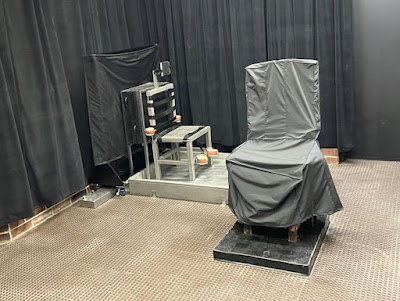Day two of the trial challenging the constitutionality of South Carolina's execution methods began with opening statements from the attorneys representing four men sitting on death row and lawyers for the South Carolina Department of Corrections.
"It does not guarantee a painless death," said Daniel Plyler, attorney for SCDC, during his opening statement regarding the revised statute that made the electric chair the default method of execution and a firing squad a third option. "Just like none of us in this courtroom or in this state are guaranteed a painless death."
Following opening statements, SCDC director Bryan Stirling and Colie Rushton, SCDC's director of security and emergency operations, testified. They mainly spoke about their knowledge of execution protocols.
An expert witness for the plaintiffs, John Wikswo, a professor from Vanderbilt University with expertise in molecular physiology and biomedical engineering, also testified.
Here are some key takeaways:
- SCDC Director Bryan Stirling was the first witness to testify Tuesday. Greenville attorney Joshua Kendrick, representing the death row inmates, asked about his knowledge of the operation of the state's electric chair. The chair was purchased in 1912 and eventually placed in Broad River Correctional Institute in Columbia in 1988. Its last use was June 20, 2008.
- Kendrick asked Stirling how old the chair was, to which Stirling responded, "I'd be speculating... it's been around for a long time." According to prior reporting for The Greenville News in June, the chair is maintained and has been "recently tested," according to Chrysti Shain, spokeswoman for SCDC. However, during his testimony, Stirling said he did not have any involvement in any testing and did not direct it to take place.
- Detailed information for execution protocols remains under a confidentiality order, but voltage sequencing was described as a three-phase sequence, starting at 2,000 volts for four-and-a-half seconds, 1,000 volts for eight seconds and 120 volts for 120 seconds. When asked if they had any idea why the specific voltage and timing sequence was used, both Rushton and Stirling responded they did not know.
- Rushton, who's worked at SCDC for almost 49 years and started in his current position in 2007, developed the firing squad protocol for SCDC. During his testimony, Kendrick asked if he researched how the U.S. military historically conducted firing squad executions or looked into its use in other countries. Rushton said his research included information from the state of Utah — one of four other states that use the firing squad — and the internet.
- During testimony, Rushton confirmed .308 Winchester TAP Urban ammunition, a fragmented bullet, would be used during firing squad executions, a detail not previously disclosed about the process. Rushton explained his research showed this ammunition would cause more instantaneous death.
- John P. Wikswo was submitted as an expert witness by the plaintiffs to provide detail on how electricity impacts the human body. Wikswo has testified in other death penalty cases in the past. Wikswo maintained that, from his research, there is no scientific evidence electrocution causes instantaneous or painless death.
- "The animal husbandry community, after intense work, has concluded that they would not do to an animal in the slaughterhouse what is done in South Carolina in the death penalty," Wikswo said of physiological research conducted into how cattle react to electricity.
- Plyler spent cross examination questioning Wikswo's reliability and recollection of his previous statements in his deposition. The judge did comment Wikswo gave contradicting testimony; however, he maintained he believes "there is no proof that judicial electrocutions, botched or not, provide instantaneous death" after Plyler's questioning.
Wednesday's testimony will include the plaintiff's final expert witness, forensic pathologist Dr. Jonathan Arden, and witnesses from the state, some of who will participate virtually.
🚩 | Report an error, an omission, a typo; suggest a story or a new angle to an existing story; submit a piece, a comment; recommend a resource; contact the webmaster, contact us:
deathpenaltynews@gmail.com.
Opposed to Capital Punishment? Help us keep this blog up and running! DONATE!
"One is absolutely sickened, not by the crimes that the wicked have committed,
but by the punishments that the good have inflicted." -- Oscar Wilde













